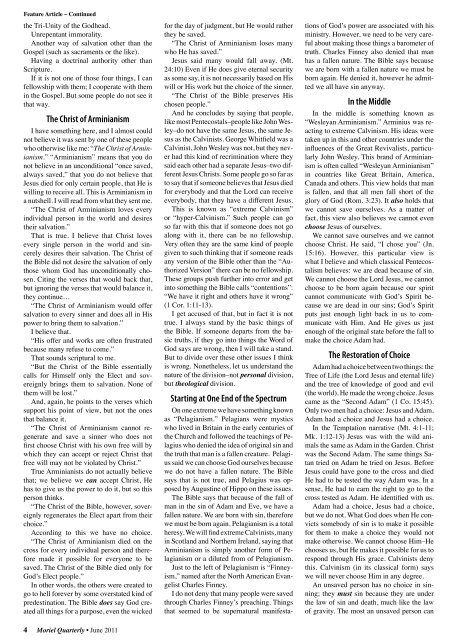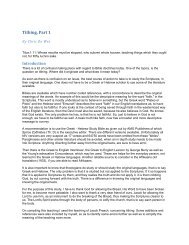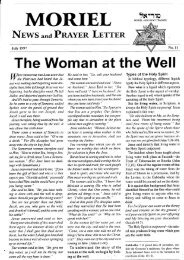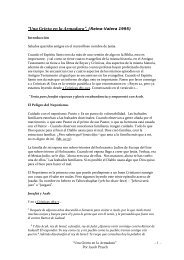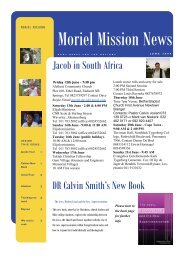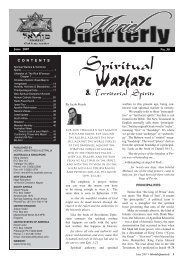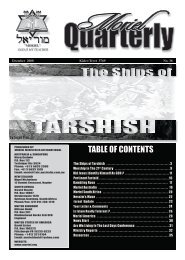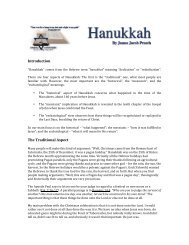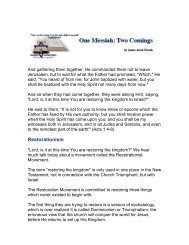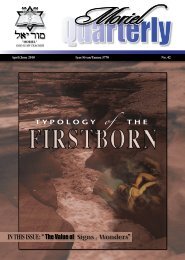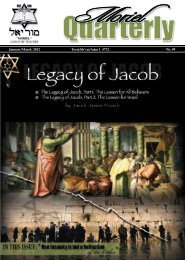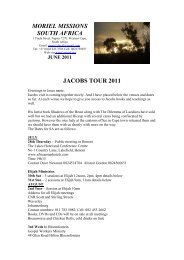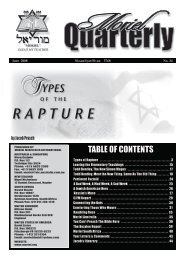April/June 20 No. 46 Nisan/Iyar//Sivan 577 - Moriel Ministries
April/June 20 No. 46 Nisan/Iyar//Sivan 577 - Moriel Ministries
April/June 20 No. 46 Nisan/Iyar//Sivan 577 - Moriel Ministries
Create successful ePaper yourself
Turn your PDF publications into a flip-book with our unique Google optimized e-Paper software.
Feature Article – Continued<br />
the Tri-Unity of the Godhead.<br />
Unrepentant immorality.<br />
Another way of salvation other than the<br />
Gospel (such as sacraments or the like).<br />
Having a doctrinal authority other than<br />
Scripture.<br />
If it is not one of those four things, I can<br />
fellowship with them; I cooperate with them<br />
in the Gospel. But some people do not see it<br />
that way.<br />
The Christ of Arminianism<br />
I have something here, and I almost could<br />
not believe it was sent by one of these people<br />
who otherwise like me: “The Christ of Arminianism.”<br />
“Arminianism” means that you do<br />
not believe in an unconditional “once saved,<br />
always saved,” that you do not believe that<br />
Jesus died for only certain people, that He is<br />
willing to receive all. This is Arminianism in<br />
a nutshell. I will read from what they sent me.<br />
“The Christ of Arminianism loves every<br />
individual person in the world and desires<br />
their salvation.”<br />
That is true. I believe that Christ loves<br />
every single person in the world and sincerely<br />
desires their salvation. The Christ of<br />
the Bible did not desire the salvation of only<br />
those whom God has unconditionally chosen.<br />
Citing the verses that would back that,<br />
but ignoring the verses that would balance it,<br />
they continue…<br />
“The Christ of Arminianism would offer<br />
salvation to every sinner and does all in His<br />
power to bring them to salvation.”<br />
I believe that.<br />
“His offer and works are often frustrated<br />
because many refuse to come.”<br />
That sounds scriptural to me.<br />
“But the Christ of the Bible essentially<br />
calls for Himself only the Elect and sovereignly<br />
brings them to salvation. <strong>No</strong>ne of<br />
them will be lost.”<br />
And, again, he points to the verses which<br />
support his point of view, but not the ones<br />
that balance it.<br />
“The Christ of Arminianism cannot regenerate<br />
and save a sinner who does not<br />
first choose Christ with his own free will by<br />
which they can accept or reject Christ that<br />
free will may not be violated by Christ.”<br />
True Arminianists do not actually believe<br />
that; we believe we can accept Christ, He<br />
has to give us the power to do it, but so this<br />
person thinks.<br />
“The Christ of the Bible, however, sovereignly<br />
regenerates the Elect apart from their<br />
choice.”<br />
According to this we have no choice.<br />
“The Christ of Arminianism died on the<br />
cross for every individual person and therefore<br />
made it possible for everyone to be<br />
saved. The Christ of the Bible died only for<br />
God’s Elect people.”<br />
In other words, the others were created to<br />
go to hell forever by some overstated kind of<br />
predestination. The Bible does say God created<br />
all things for a purpose, even the wicked<br />
for the day of judgment, but He would rather<br />
they be saved.<br />
“The Christ of Arminianism loses many<br />
who He has saved.”<br />
Jesus said many would fall away. (Mt.<br />
24:10) Even if He does give eternal security<br />
as some say, it is not necessarily based on His<br />
will or His work but the choice of the sinner.<br />
“The Christ of the Bible preserves His<br />
chosen people.”<br />
And he concludes by saying that people,<br />
like most Pentecostals–people like John Wesley–do<br />
not have the same Jesus, the same Jesus<br />
as the Calvinists. George Whitfield was a<br />
Calvinist, John Wesley was not, but they never<br />
had this kind of recrimination where they<br />
said each other had a separate Jesus–two different<br />
Jesus Christs. Some people go so far as<br />
to say that if someone believes that Jesus died<br />
for everybody and that the Lord can receive<br />
everybody, that they have a different Jesus.<br />
This is known as “extreme Calvinism”<br />
or “hyper-Calvinism.” Such people can go<br />
so far with this that if someone does not go<br />
along with it, there can be no fellowship.<br />
Very often they are the same kind of people<br />
given to such thinking that if someone reads<br />
any version of the Bible other than the “Authorized<br />
Version” there can be no fellowship.<br />
These groups push further into error and get<br />
into something the Bible calls “contentions”:<br />
“We have it right and others have it wrong”<br />
(1 Cor. 1:11-13).<br />
I get accused of that, but in fact it is not<br />
true. I always stand by the basic things of<br />
the Bible. If someone departs from the basic<br />
truths, if they go into things the Word of<br />
God says are wrong, then I will take a stand.<br />
But to divide over these other issues I think<br />
is wrong. <strong>No</strong>netheless, let us understand the<br />
nature of the division–not personal division,<br />
but theological division.<br />
Starting at One End of the Spectrum<br />
On one extreme we have something known<br />
as “Pelagianism.” Pelagians were mystics<br />
who lived in Britain in the early centuries of<br />
the Church and followed the teachings of Pelagius<br />
who denied the idea of original sin and<br />
the truth that man is a fallen creature. Pelagius<br />
said we can choose God ourselves because<br />
we do not have a fallen nature. The Bible<br />
says that is not true, and Pelagius was opposed<br />
by Augustine of Hippo on these issues.<br />
The Bible says that because of the fall of<br />
man in the sin of Adam and Eve, we have a<br />
fallen nature. We are born with sin, therefore<br />
we must be born again. Pelagianism is a total<br />
heresy. We will find extreme Calvinists, many<br />
in Scotland and <strong>No</strong>rthern Ireland, saying that<br />
Arminianism is simply another form of Pelagianism<br />
or a diluted from of Pelagianism.<br />
Just to the left of Pelagianism is “Finneyism,”<br />
named after the <strong>No</strong>rth American Evangelist<br />
Charles Finney.<br />
I do not deny that many people were saved<br />
through Charles Finney’s preaching. Things<br />
that seemed to be supernatural manifestations<br />
of God’s power are associated with his<br />
ministry. However, we need to be very careful<br />
about making those things a barometer of<br />
truth. Charles Finney also denied that man<br />
has a fallen nature. The Bible says because<br />
we are born with a fallen nature we must be<br />
born again. He denied it, however he admitted<br />
we all have sin anyway.<br />
In the Middle<br />
In the middle is something known as<br />
“Wesleyan Arminianism.” Arminius was reacting<br />
to extreme Calvinism. His ideas were<br />
taken up in this and other countries under the<br />
influences of the Great Revivalists, particularly<br />
John Wesley. This brand of Arminianism<br />
is often called “Wesleyan Arminianism”<br />
in countries like Great Britain, America,<br />
Canada and others. This view holds that man<br />
is fallen, and that all men fall short of the<br />
glory of God (Rom. 3:23). It also holds that<br />
we cannot save ourselves. As a matter of<br />
fact, this view also believes we cannot even<br />
choose Jesus of ourselves.<br />
We cannot save ourselves and we cannot<br />
choose Christ. He said, “I chose you” (Jn.<br />
15:16). However, this particular view is<br />
what I believe and which classical Pentecostalism<br />
believes: we are dead because of sin.<br />
We cannot choose the Lord Jesus, we cannot<br />
choose to be born again because our spirit<br />
cannot communicate with God’s Spirit because<br />
we are dead in our sins; God’s Spirit<br />
puts just enough light back in us to communicate<br />
with Him. And He gives us just<br />
enough of the original state before the fall to<br />
make the choice Adam had.<br />
The Restoration of Choice<br />
Adam had a choice between two things: the<br />
Tree of Life (the Lord Jesus and eternal life)<br />
and the tree of knowledge of good and evil<br />
(the world). He made the wrong choice. Jesus<br />
came as the “Second Adam” (1 Co. 15:45).<br />
Only two men had a choice: Jesus and Adam.<br />
Adam had a choice and Jesus had a choice.<br />
In the Temptation narrative (Mt. 4:1-11;<br />
Mk. 1:12-13) Jesus was with the wild animals<br />
the same as Adam in the Garden. Christ<br />
was the Second Adam. The same things Satan<br />
tried on Adam he tried on Jesus. Before<br />
Jesus could have gone to the cross and died<br />
He had to be tested the way Adam was. In a<br />
sense, He had to earn the right to go to the<br />
cross tested as Adam. He identified with us.<br />
Adam had a choice, Jesus had a choice,<br />
but we do not. What God does when He convicts<br />
somebody of sin is to make it possible<br />
for them to make a choice they would not<br />
make otherwise. We cannot choose Him–He<br />
chooses us, but He makes it possible for us to<br />
respond through His grace. Calvinists deny<br />
this. Calvinism (in its classical form) says<br />
we will never choose Him in any degree.<br />
An unsaved person has no choice in sinning;<br />
they must sin because they are under<br />
the law of sin and death, much like the law<br />
of gravity. The most an unsaved person can<br />
<strong>Moriel</strong> Quarterly • <strong>June</strong> <strong>20</strong>11


